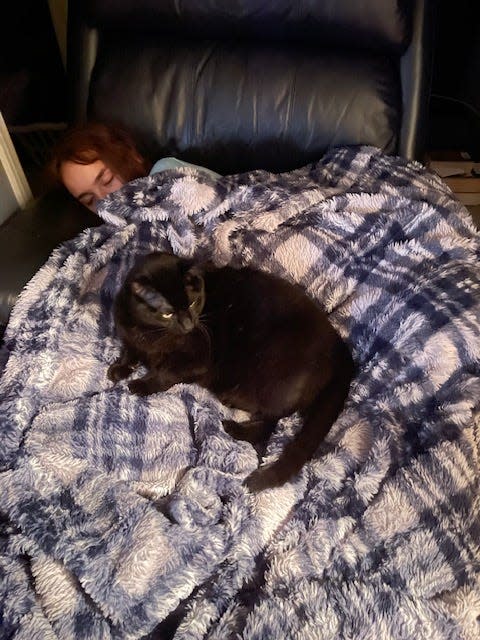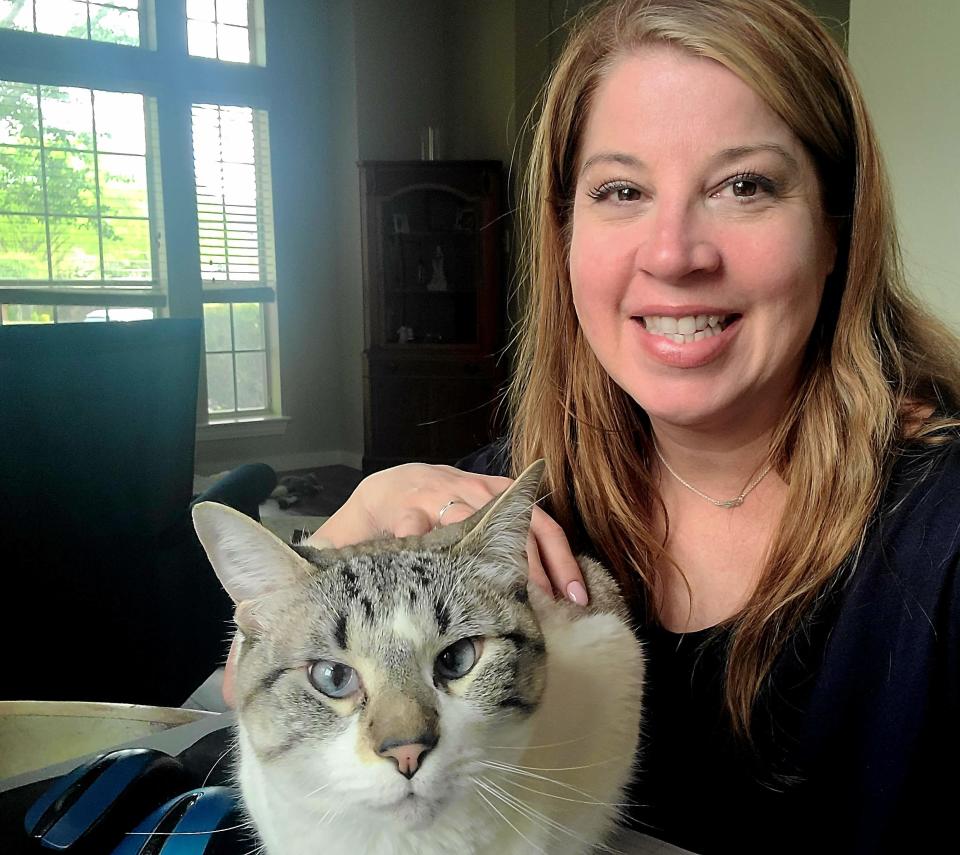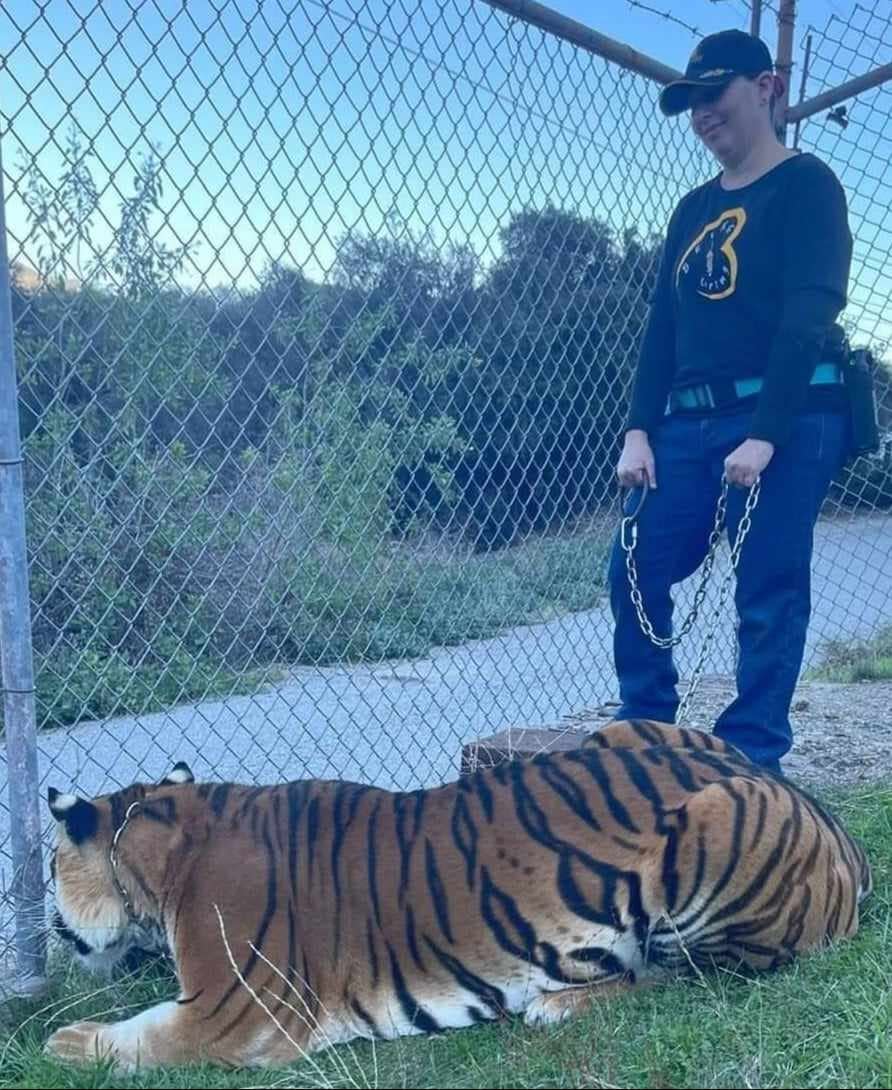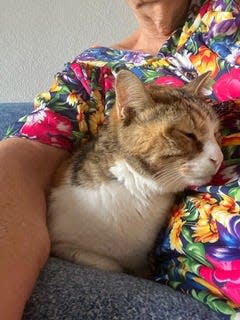Here and meow: Why being a cat lady is now cool (Just ask Taylor Swift)
Forget the stereotype of the solitary spinster, muttering to a clowder of cats, a lonely old lady whose only friends are feline and whose connection with the outside world is tenuous at best.
Cat ladies are cool. And they know it.
"People are pushing back against their experiences around sexism ? and especially Gen Z (those born after 1997) are doing that with things that were previously seen as pejoratives, or marginalized, things that were always popular within the queer and female communities," said Adrienne Massanari, an associate professor of communications at American University.
Massanari, who's written about internet culture and feminism ? and whose American University faculty photo includes her late cat, Mr. Pants ? said women are "reclaiming the narrative" of the crazy cat lady and finding that reclamation empowering.
"A lot of that is done by people who in other ways don’t feel accepted, so it makes sense you create community around these creatures," and that community can be found online, she said.
"The internet provided people with a place to explore niche, what we in academics would call non-normative things," she said. Cats, with their reclusive, independent nature, are seen as complex, thoughtful, private, making them the perfect "cyphers for things like memes," videos and other internet staples.
"All the things we ascribe to them as humans," Massanari said. "They're cuddly, but on their own terms."
Time magazine ran headfirst into 2024 cattitude when it tapped Taylor Swift as Person of the Year. The planet's most popular woman had one query for the photo shoot: "Can I bring my cat?"
Famous or not, meet some other feline owners who are thrilled to purr about their pets.

'Useful critters, but not really loving,' until she met Mars
At a rescue run by a friend and law school classmate, Renee Trotter and her daughter, still reeling from being bullied at school, were told this particular cat, plucked off the streets as a stray, might not be a good match for their family. He wasn't particularly affectionate. Wasn't interested in human company.
That was fine with Trotter, who wanted a cat because she discovered a mouse in her Washington, D.C.-area home. "I thought of cats as useful critters, but not really loving," she said, explaining she'd always been more of a dog person.
But the black cat, who would eventually be named Mars, "came to the gate at the kennel to love on (her daughter)," Trotter said. "And I thought, well, this seems like it might be OK. And he's been the best addition to our family ? and he's really good at killing rodents."
Better than his skills as a mouser, though, Mars is a de facto therapy cat for Trotter's teenage daughter, who'd struggled with anxiety so badly she required homeschooling for a time.
"He could figure out when she was having a bad day better than any human could," said Trotter, a civil rights attorney. When Trotter's daughter was anxious but didn't want to open up to her parents, Mars would lie on her and "you could actually see her relax," she said. "I will see her having conversations with him in her bedroom. They have a language only they understand."
Trotter, who later adopted another cat, Minerva, from the same rescue, rejects the idea that being a cat lady means being single, lonely or unloved. "They're a stabilizing thing in people's lives, and I think cat people are as diverse as any other group. There's a misperception of women trying to bond with something that doesn't reciprocate, but a cat does reciprocate; they just don't have to be clingy. It's like women ? we can be in a relationship and still be independent."
Cat caretakers, and cats as caretakers
Heidi Wysocki rescued a cross-eyed Siamese Manx, Dr. Booples, but he's hardly the first cat who's been in her life.
When she was 20, Wysocki moved to Washington, D.C., and adopted a cat from a man entering hospice because of AIDS. "He cried when he said goodbye to her and thanked me for taking his cat," Wysocki remembered. "He called a month later with a horrid cough, to make sure she was adapting well and told me to tell her how much he loved her still. I had Miss Kitty for 10 years."
In between, there was Frank, Luper the Pooper and Dingdong, who accompanied her on her lap for a three-day car trip when she moved from New York to Texas.
"Boops sings the song of his people ... has a stuffed animal that he drags around the house, and he spends most of his time crammed into boxes," Wysocki said. "He likes 'em tight, like your friend from 1990 who insists that shirt she wore to the Arcadia concert where she made eye contact with Simon Le Bon still fits." He also likes to "supervise" Wysocki as she works from home as a project manager, showing his backside to government clients on video meetings.

Cats, she said, are the perfect pet for Gen Xers like her: "They thrive with little supervision and are adaptable ... until they don't want to be."
Kelley Bevis co-founded A Cat's Life Rescue, based in Prince George's County, Maryland, with Niki Cochran. The all-volunteer rescue, which adopts out about 250 cats and kittens each year, also offers TNR (trap, neuter, return) services, collecting strays to be neutered and vaccinated then released back to where they were found.
"Cats have a little bit of a bad reputation but they can be wonderful, comforting animals," said Bevis, the rescue's executive director and an attorney for a charity monitoring organization. One example: Trotter, who adopted her daughter's feline best friend from A Cat's Life.
Being called a cat lady doesn't bother her.
"I am definitely known as the crazy cat lady in the neighborhood," where she lives with her wife and their four rescue kitties. "I get tagged on every Facebook post; people come to my house with strays. I embrace it; it's who I am."
Big cat lady; an international cat lady
Cheryl Holtzman is "definitely a crazy cat lady," but the 41-year-old with 21 cats and several strays she feeds takes it a step further.
"I am what I like to call a psycho cat lady," the Riverside, California, resident said. After earning a degree in exotic animal training and management from Moorpark College, she's worked with big cats: bobcats, servals, lions and tigers. In addition to training and rescuing cats, she works with special effects artist Eric Fox, a career that, she said "just adds to the craziness of my life."

Cats have always been part of Karen James' life, and when she married her husband, they became part of his, too: Her wedding vows included the usual "love, honor and cherish," but also that she might not tell him before she brought home another animal.
"My husband never owned pets growing up and didn’t know how wonderful cats were until I brought them into his life," she said. "But now he loves Luna as much as I and we are a little family because of it."
Their little family is separated right now, though, while James and her husband are in South Sudan. She's in U.S. Agency in International Development's (USAID) Foreign Service so Luna is with a friend in El Salvador. The 49-year-old and her husband have adopted cats from Morocco, the Philippines, Afghanistan and Guatemala.

Luna was adopted while James and her husband were living in Guatemala City and took a short trip to Antigua. While there, they met a woman who, despite being very poor, took care of stray cats and dogs. "Suddenly a very pregnant cat with beautiful blue eyes came and plopped her pregnant belly down by my feet," Allen said.
"I told the lady that I would take one of her kittens if they were healthy and if she agreed I would pay for the mama’s sterilization and bring cat food," she said. "She was very excited about that plan and once the kittens were old enough I was able to come and get my girl. "
Cats who help fill a void
For some, cats are a way to experience unconditional love. Carole Olimbe isn't able to have children, but the Fargo, North Dakota, woman said her two orange cats, Albert and Norman, "fill a deep seated need to nurture."
"They make me laugh and keep me sane, they give me a reason to keep going when my depression gets severe, and they fill a void for me that I just don’t think anything else could."
Lauren Tiede left her beloved cat, Bailey, with her parents while she battled addiction. Bailey felt like "an emotional support cat," and upon Tiede's return home after treatment, never left her side.
"She was with me through the worst times and then the best, my first five years sober she followed me wherever I went and slept with me every night. She passed in 2020 and I got a memorial tattoo for her shortly after."
Phaedra Trethan still misses her cat, Hobbes, an excellent mouser and an even better friend, who died in 2012. Reach her at [email protected], @wordsbyphaedra on X and @by_phaedra on Threads.
This article originally appeared on USA TODAY: Why being a cat lady is now cool. Just ask Taylor Swift.
